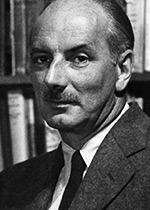Lewis Mumford
| Full Name: | Lewis Mumford |
| Born: | October 19, 1895 Flushing, New York, USA |
| Died: | January 26, 1990 Amenia, New York, USA |
| Occupation: | Historian, Sociologist, Philosopher, Writer, Critic |
| Nationality: | American |
| Links: |
|
Biography
Lewis Mumford was an American historian, sociologist, philosopher of technology, and literary critic. Particularly noted for his study of cities and urban architecture, he had a broad career as a writer. He made significant contributions to social philosophy, American literary and cultural history, and the history of technology.
Mumford was influenced by the work of Scottish theorist Sir Patrick Geddes and worked closely with his associate the British sociologist Victor Branford. Mumford was also a contemporary and friend of Frank Lloyd Wright, Clarence Stein, Frederic Osborn, Edmund N. Bacon, and Vannevar Bush.
Mumford was born in Flushing, Queens, New York, and graduated from Stuyvesant High School in 1912. He studied at the City College of New York and The New School for Social Research, but became ill with tuberculosis and never finished his degree. In 1918 he joined the Navy to serve in World War I and was assigned as a radio electrician. He was discharged in 1919 and became associate editor of The Dial, an influential modernist literary journal. He later worked for The New Yorker where he wrote architectural criticism and commentary on urban issues.
Mumford was elected to the American Philosophical Society in 1941 and the American Academy of Arts and Sciences in 1947. In 1963, Mumford received the Frank Jewett Mather Award for art criticism from the College Art Association. Mumford received the Presidential Medal of Freedom in 1964. In 1975 Mumford was made an honorary Knight Commander of the Order of the British Empire (KBE). In 1976, he was awarded the Prix mondial Cino Del Duca. In 1986, he was awarded the National Medal of Arts.
Works in the WWEnd Database
Non Series Works |
|||||||||||||||||||
|
|
|
|
|
|||||||||||||||



















 Full Details
Full Details







